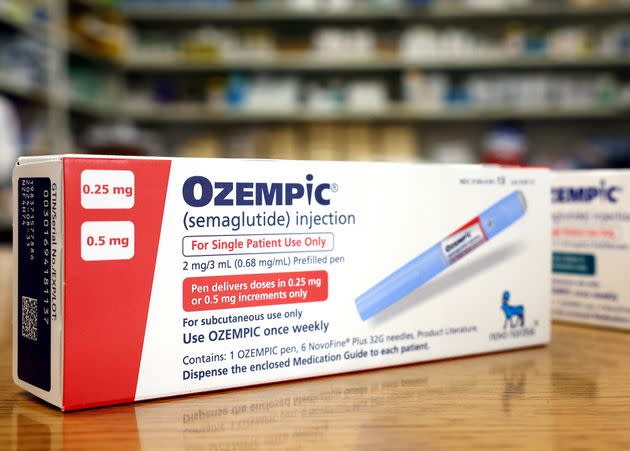Louisville patients warn about dangers of weight loss drugs and life-changing side effects

KY LOUISVILLE (WDRB) — A Louisville resident says she nearly died after using a well-known weight-loss medication that was recommended for her Type 2 diabetes.
Thousands more people are enduring the severe side effects of medications like Ozempic, according to WDRB Investigates, which began looking into these issues.
Jacqueline Barber has had a protracted health journey.
Barber broke down in tears as she described the health problems she had experienced. “I just see my sisters and my dad, how upset they were and they would see me every week and I would get smaller and smaller,” she added.
In 2021, Barber’s doctors administered Ozempic to manage her Type 2 diabetes; nevertheless, she reported numerous difficulties and inability to eat as a result of the medication. According to Barber, she was only able to eat peanuts, peanut butter crackers, and peanut butter cookies without being sick.
“To lay on the couch and throw up nonstop, can’t hardly make it to walk, go anywhere, it’s very depressing,” she stated. “I shed 140 pounds in the end. I had dropped to about 87 pounds, was unable to move or walk, and was unable to get off the couch. Nobody was aware of the situation. Nobody connected the two.”
Medication for weight loss such as Ozempic, Wegovy, and Mounjaro was not common three years ago.
Barber said, “I’ve never heard of the medication before.”
However, advertisements for the drugs are now ubiquitous on social media and television.
Barber’s doctors eventually advised her to cease taking the Ozempic in 2023 after two years, despite the fact that her diabetes had stabilized.
Her words, “My stomach was paralyzed,” “I couldn’t tolerate anything.”
Barber had acquired gastroparesis, but she wasn’t the only person to experience problems after using weight loss pills.
Bariatric surgeon Dr. John Oldham of Baptist Health explained gastroparesis as “when food goes down to the stomach and it doesn’t empty out to the small intestine, so it just sits in the stomach.”
According to Oldham, anyone taking any kind of medicine for weight loss need to be properly watched.
“All you have to do is confirm that you are following your doctor’s instructions.” There will be a follow-up for you. Blood work will be performed to ensure that you are responding properly to the drug,” he stated. “Ozempic and Wegovy, on average, we’re seeing 15% of weight loss.”
According to Oldham, there are advantages to the medications, which also aid in the treatment of kidney and cardiovascular disorders.
“The rare things, the thyroid tumors, cancers, we have not seen though,” he stated. “That’s what we saw in rodents when the study came out.”
According to Oldham, these medications are not given to people who have a history of thyroid problems.
“Nausea is the most common adverse reaction to this medication,” he stated, emphasizing that it should only last a few hours and that you should get in touch with your doctor if it persists.
According to Oldham, physicians frequently refer patients to the emergency room (ER) for side effects from weight loss drugs.
“I was given advice about a patient who visited the emergency room this morning and took her second dose of Mounjaro medication when I just left the hospital to come over today. Three hours later, he reported, “she was experiencing bloating and abdominal pain.” “Her CT scan is actually showing a gastric outlet obstruction, where her stomach is very dilated full of food, not wanting to pass.”
He added that there are a number of more cases of problems.
“A few days ago, I had a study where the patient passed away due to necroptosis and pancreatitis. The patient was using Zepbound and Mounjaro; it’s unclear if the drug caused the pancreatitis,” Oldham added, noting that most people may recover from pancreatitis without going to the hospital.
“I have one patient that I’m doing a gastric bypass on, that has gastroparesis,” he stated. “She was taking the medication back in the fall, only taking it for a month and now has severe gastroparesis where nothing is helping.”
According to Barber’s lawyer Andrew Van Arsdale of the AVA Law Group, he currently represents 213 people with comparable problems in Kentucky and Indiana.
“We know roughly 3% of the U.S. population is on the drugs and there is increasingly alarming rates of serious gastro and intestinal problems with the population that is taking this drug,” Van Arsdale stated.
The Louisville region is home to seventeen of those cases. In their legal battle against Novo Nordisk, the manufacturer of Ozempic and related medications, Van Arsdale is fighting on behalf of more than 2,000 patients nationwide. He said that thousands of patients are coping with medication side effects.
“At that time, I believe there were over 10,000 documented cases in the nation as a whole. Unfortunately, that number is rising daily,” he remarked. “The lawsuits are all about asking the drug companies that are aware of these dangers to adequately warn consumers.”
Of the more than 2,000 people he saw, Van Arsdale said that 60% used the medications to lose weight and 40% to treat diabetes.
“Each of the manufacturers making drugs in this category need to do better,” he stated.
Several other individuals who took well-known weight-loss medications and experienced similar side effects were reported to WDRB Investigators.
A woman from Prospect said that after taking Wegovy to lose weight, she had gastrointestinal problems that required surgery.
The woman, who wished to remain anonymous, stated, “I started taking Wegovy about 2.5 years ago when I was suffering from back arthritis pretty badly.” “My pain management physician informed me that my 220 pounds of weight was the sole cause of my problems and that I would have to start losing weight right now to avoid chronic pain in the future.
I was prescribed Wegovy by my primary care physician. Just a prescription, no conversations, no cautions. As soon as I took it, I began experiencing the “typical” side effects—nausea—that I had read about on the package.”
She said that her negative effects worsened to the point that surgery was necessary.
“Going from 220 to 146 pounds, and back up to 220 pounds, in two years has been absolutely devastating to my body and mind,” she stated. “I want physicians to follow up with their patients. I want it known that you will either immediately regain it or you will take this drug for the rest of your life. I want everyone to know that it can result in anorexia. It can ruin your colon, and I want that to be known.”
Murray, Kentucky resident Jada Kimbro said to WDRB News, “Even if I would want to switch, I still have to take the Ozempic. Since I started doing this approximately a year and a half ago, I have lost almost 40 pounds.
“Unlike some, I haven’t been admitted to the hospital. I had a scope and a gastroparesis study done last year, and they both came out fine. However, I should also mention that a lot of my muscle has deteriorated as a result of this. I used to be really athletically built, but occasionally, especially in my legs and buttocks, I feel like my muscle is wrapping around my bones,” Kimbro remarked.
Rose Daugherty, a resident of Winchester, Kentucky, said she visited the ER for similar issues.
“(I) have had nothing but sickness since taking Ozempic, throwing up and diarrhea,” stated Daugherty. “I even had to go to the ER for dehydration and even now am still sick a lot of times.”
The Eastern District of Pennsylvania is currently the central venue for the litigation against Ozempic and other pharmaceutical manufacturers.
“These guys are making so much money by prescribing this drug to anyone and everyone that is able to get their hands on it,” Van Arsdale remarked. “They have an obligation to do better to warn about the dangers associated with it.”
According to Van Arsdale, the case is a mass tort, meaning that the damages are not the same as in a class action lawsuit.
“When we look at these cases, they have to look at it on a per claimant basis and make reparations and restitutions on how severely the drug affected them, so it’s called a mass torte,” he explained.
“Someone starting the drug today doesn’t understand the risks of gastroparesis because these drug companies have failed to adequately warn them and we’re asking them to correct that problem,” Van Arsdale stated. “Hoping to get a trial as soon as humanly possible and to put on our evidence why the drug makers knew of these dangers and why they’re liable to Jacqueline and others for failing to prevent this from happening to them.”
Novo Nordisk provided WDRB News with the following statement but denied an on-camera interview:
“Novo Nordisk plans to mount a resolute defense against these claims, believing the accusations in these litigation to be without substance.
“At Novo Nordisk, patient safety is our first concern. We collaborate closely with the US Food and Drug Administration to regularly assess the safety profile of our medications. GLP-1 inhibitors have been used for more than 18 years to treat type 2 diabetes (T2D) and for 8 years to treat obesity. This includes Novo Nordisk GLP-1 medications that have been available for sale for more than 13 years, such as liraglutide and semaglutide. Semaglutide has been thoroughly investigated in several real-world evidence trials, strong clinical development programs, and clinical experience spanning over 9.5 million patient years.
“The FDA-approved product labeling for liraglutide and semaglutide describes the recognized risks and benefits of these medications. When administered as prescribed and under the supervision of a qualified healthcare provider, Novo Nordisk guarantees the safety and effectiveness of all of its GLP-1 medications.”
“Well the drug was on the market for couple of years and all of a sudden lot of people had their gallbladder removed as a result of taking these drugs, (so) they updated the label,” Van Arsdale explained. “We’re asking them to do the same thing about gastroparesis.”
The creator of Mounjaro, Eli Lilly, was contacted by WDRB News as well, but they have not responded.
Now that she is gaining weight, Barber receives her nutrition via an IV when she is unable to keep down any food.
Shouting, “I’ve had this PICC line for a year,” she added.
In order to address stomach muscle problems, Barber also underwent surgery to implant a gastric stimulator.
She pointed to a bag containing her IV and explained, “These are my vitamins and nutrients.” “This has carbohydrates, lipids, protein.”
According to Barber, a nurse pays a weekly visit to her home. She used to have a feeding tube.
“I’m hoping the drug makers have to change this drug,” she stated. Tell individuals what can happen to them if it’s so good and it’s assisting the entire population in reducing their weight. Make an effort to perform better.”
Van Arsdale went on, “We’re not demanding they take the drug off the market.” We’re not arguing that this is a bad substance. We’re advocating letting customers make an informed choice on it.”




